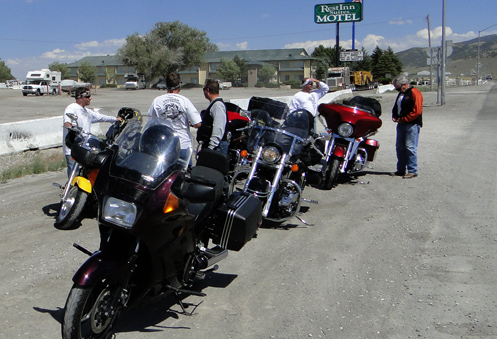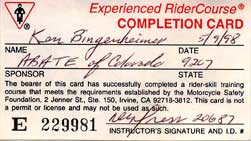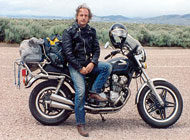Rider Training Program Threatened
Thursday, December 8th, 2011Are you aware that when you renew your plates on your motorcycle(s) each year in Colorado you pay $4 that goes into a fund to help defray the cost of rider training courses? Also, anyone renewing their driver’s license with motorcycle accreditation pays an extra $2 that goes to the same fund.
 This is all set in place because some years ago the motorcycling community asked for it. The general idea is that it is a good thing for everybody to have the folks riding motorcycles actually get some training so they can do it competently. The accompanying concept was that such a program could help to forestall proposals that Colorado institute a mandatory helmet law. That is to say, education and better riding skills do more to prevent traffic fatalities than wearing helmets. Or, to put it differently, crash prevention is better than having safer crashes.
This is all set in place because some years ago the motorcycling community asked for it. The general idea is that it is a good thing for everybody to have the folks riding motorcycles actually get some training so they can do it competently. The accompanying concept was that such a program could help to forestall proposals that Colorado institute a mandatory helmet law. That is to say, education and better riding skills do more to prevent traffic fatalities than wearing helmets. Or, to put it differently, crash prevention is better than having safer crashes.
Regardless of how you might feel about helmet laws, I don’t see how anyone can argue that it is not better to avoid crashing than to crash and not get hurt so badly.
The vehicle for this funneling of fees to rider training is Colorado’s Motorcycle Operator Safety Training program or MOST. MOST is now under attack, in some cases from organizations that originally supported its creation.
I could go on at great length with the history and background of what is currently going on, as ABATE of Colorado’s State Coordinator Terry Howard did with me, but I’ll give you the short version.
ABATE, Riders for Justice, some of the motorcycle clubs, dealerships, and others pushed for the training approach. Over the years the program was not given sufficient oversight and some problems developed. The Colorado Legislature this past year conducted an audit of the program and identified a number of issues. Several of those issues were immediately addressed and rectified and the rest will soon have been fixed.
In the meantime, however, new people have replaced the old, and in organizations such as the Colorado Confederation of Clubs (COC) which came into existence later, there is no understanding of the history of and reasons for the fees. Some of the previous supporters are now saying, “Why should we have to pay to reduce the cost for other people to learn to ride?”
In a twist that gives fits to Terry Howard, a Republican, the legislative audit committee was divided on party lines–with the Republicans being the ones she finds herself in opposition to. In the current anti-tax atmosphere, the Republicans on the committee are in favor of eliminating MOST and letting us keep our $4 and $2 fees. It is the Democrats who are saying, “The motorcyclists asked for this program, and for these fees to be levied on them, so let’s keep the fees and keep the program they fund.”
One other thing to keep in mind: If MOST is killed there is no certainty that the fees will be eliminated. We could end up paying the fees without getting the benefit.
The committee deadlocked in this past session, but it seems likely that Republican Rep. Marsha Looper, of Colorado Springs, will introduce legislation in the next session to kill MOST. This would be a good topic for all Colorado motorcyclists to learn more about, and then do what you can to educate your legislators, whether you support MOST or oppose it. Most of them don’t know anything at all about it.
Recent from National Motorcycle Examiner
NHTSA proposes additional naturalistic motorcycle safety study
Biker Quote for Today
Statistics show that most solo motorcycle accidents are caused by a defective nut holding the handlebars.
 Rather than paraphrase it all I’ll just quote from the release:
Rather than paraphrase it all I’ll just quote from the release:
 Pretty much all major motorcycling organizations have opposed that, and I reported in a report from the
Pretty much all major motorcycling organizations have opposed that, and I reported in a report from the 